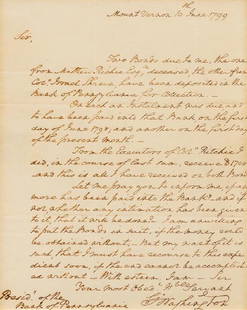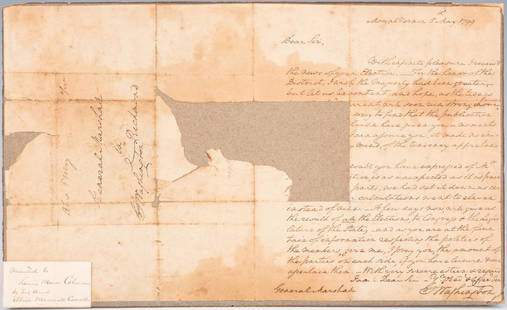

 Discovery- InteriorsBonhamsSponsored.Your ad here?
Discovery- InteriorsBonhamsSponsored.Your ad here?



Discovery- Interiors
Bonhams
Sponsored.Your ad here?


 Discovery- InteriorsBonhamsSponsored.Your ad here?
Discovery- InteriorsBonhamsSponsored.Your ad here?



Discovery- Interiors
Bonhams
Sponsored.Your ad here?

60148: George Washington letter signed ("Go: Washington
Similar Sale History
Recommended Items







Item Details
Description
George Washington letter signed ("Go: Washington"). One page of a bifolium, 9" x 14.5", "Head Qrs, Morristown" [New Jersey]; February 9, 1777. Docketed. General Washington requests McDougall forward a letter to General James Clinton. Letter, in the hand of Robert H. Harrison (1745-1790), de facto chief of staff of Washington's headquarters during most of the Revolutionary War, to Brigadier General Alexander McDougall, stationed at Peekskill, New York, requesting the general forward a letter from Washington to General James Clinton, ordering him to the Northern Department unless McDougall's health prevents Clinton's departure. It reads, in full: "Dear Sir General Schuyler having wrote in a pressing and urgent manner for a General Officer to be sent to the Northern department, I inclose you open, a Letter for Brigadr. James Clinton, which you will forward to him after sealing it, provided in your opinion his services can be dispensed with where he now is. This I immagine [sic] will in a great measure depend on the State of health you are in; If you are so far recovered as to be able to discharge the duties to which he was appointed, I should suppose he can well go, in which case you will succeed to his command and will order and direct every matter in such manner as your judgement and discretion shall suggest to be right and advancive of the General good. If his service cannot be dispensed with, the delivery of the Letter will be unnecessary and you may destroy it. Nothing of importance has occurred of late in the military line that you have not heard of which leaves me only to add that I am with much esteem Dr Sir Yr Most Obedt. St. Go: Washington" In his letter to McDougall, Washington, as Commander in Chief of the American forces, refers to a letter he received from Major General Philip Schuyler (1733-1804), sent from Albany, New York, dated January 25, 1777, in which Schuyler, commanding officer of the Northern Department of the Army, asks Washington to send a general officer to replace Colonel Anthony Wayne (1745-1796), who wished to move "down the Country," probably to Pennsylvania. The Northern Department was formally established from the Middle Department on April 14, 1776. Once reorganized, it included Vermont and a portion of the colony of New York north of the Hudson Highlands. Washington chose General James Clinton (1736-1812) as General Wayne's replacement. In his letter to General Clinton, enclosed in his letter to McDougall, and dated the same day, Washington ordered Clinton to Albany as soon as possible. It turned out, however, that McDougall decided not to give the letter to General Clinton, informing Washington in a February 16 letter that he was in good health but required the services of Clinton to take command of Fort Montgomery on the Hudson River. Washington agreed with McDougall's decision. Harrison wrote on the address sheet, "Genl. McDougal is requested by his Excellency to send an Escort to Governor Trumbull with Money for him when it arrives at peeks Kill." The meaning of this is explained in a letter from Washington to Jonathan Trumbull, Sr. (1710-1785), Governor of Connecticut, in which Washington enclosed a warrant for $60,000 for the use of recruitment of men in his state. When Washington wrote this letter to McDougall, he had established his headquarters in Morristown, New Jersey. After significant American morale-boosting victories over the British at Trenton (December 26, 1776) and Princeton, New Jersey (January 23, 1777), Washington marched north to Morristown, where he set up winter headquarters for himself and the Continental Army on January 6, 1777. The hills surrounding the camp provided a perfect vantage point for Washington to spy on the British army located in New York City. It was also positioned strategically to allow the Americans to monitor the roads used by the British troops. Born in Maryland and trained as a lawyer, Robert Hanson Harrison (1745-1790) was appointed General Washington's aide-de-camp in late 1775. By spring 1776, he was serving as Washington's military secretary, a position he held for the next five years. Prior to the war, Alexander McDougall (1732-1786) worked as a merchant in New York City. As tensions between the colonies and the Crown continued to rise, McDougall became increasingly furious with Britain's financial interference, eventually joining the Sons of Liberty. In 1769, he was responsible for anonymously printing the radical broadside "To the Betrayed Inhabitants of the City and Colony of New York," which created an uproar in New York City and landed McDougall in jail for libel after his identity was revealed. This further accelerated tensions in the city and led to a riot between British soldiers and the Sons of Liberty in the Battle of Golden Hill. The event also solidified McDougall's place as a known radical patriot and led to his commission as a Colonel in the Continental Army in 1775. McDougall came to be known as an officer dedicated to the Continental Army and the well-being of its soldiers, particularly after his son, Jack (1753-1775), died of camp fever in November 1775 and his younger son, Ranald (circa 1754-1786), spent time as a prisoner of war following his capture by the British in early 1776. During his service, McDougall was involved in several critical engagements, including the battles of Long Island, White Plains, and Germantown, over the course of which he was promoted to brigadier general (August 1776) and ultimately major general (October 1777). Following the war, McDougall continued his dedication to service and the welfare of his soldiers. In 1780, he represented the army before Congress to protest pay discrepancies, and again in 1783, he headed a committee of officers concerning further pay grievances. Outside of the military, he served as president of the New York Society of Cincinnati, the president of the first bank of New York, and one term as a U.S. Senator. A significant letter showing Washington in command of American forces in the Revolutionary War. It is accompanied by a hand-colored engraving of a uniformed Washington on horseback and a hand-colored engraved portrait of Washington by G. R. Hall. Condition: Separated along integral fold. Two areas of paper loss to blank portion of address leaf from seal removal upon opening. Previous separation at one horizontal fold of address leaf repaired with archival tape. Splitting starting along all other horizontal folds but chiefly unaffecting text. Scattered soiling and foxing.
HID03101062020
© 2022 Heritage Auctions | All Rights Reserved
Condition
Buyer's Premium per Lot:
25% on the first $300,000 (minimum $49), plus 20% of any amount between $300,001 and $3,000,000, plus 15% of any amount over $3,000,001 per lot.
25% on the first $300,000 (minimum $49), plus 20% of any amount between $300,001 and $3,000,000, plus 15% of any amount over $3,000,001 per lot.
Buyer's Premium
- 25% up to $300,000.00
- 20% up to $3,000,000.00
- 15% above $3,000,000.00
60148: George Washington letter signed ("Go: Washington
Estimate $32,000 - $48,000
3 bidders are watching this item.
Shipping & Pickup Options
Item located in Dallas, TX, usSee Policy for Shipping
Payment

Auction Curated By

Director Historical Manuscripts
Related Searches
TOP

















![60152: George Washington letter signed ("Go: Washington: George Washington letter signed ("Go: Washington"). Three pages of a bifolium, 9" x 14.5", "Head Quarters, Morris Town" [New Jersey]; M](https://p1.liveauctioneers.com/906/251093/130472783_1_x.jpg?height=310&quality=70&version=1654636517)
![60150: George Washington letter signed ("Go: Washington: George Washington letter signed ("Go: Washington"). One page of a bifolium, 9" x 14.25", "Head Quarters, Morris Town" [New Jersey];](https://p1.liveauctioneers.com/906/251093/130472672_1_x.jpg?height=310&quality=70&version=1654636517)

![60156: George Washington letter signed ("Go: Washington: George Washington letter signed ("Go: Washington"). One page of a bifolium, 8.25" x 13.5", "Head Quarters White Plains" [New York]; Se](https://p1.liveauctioneers.com/906/251093/130472801_1_x.jpg?height=310&quality=70&version=1654636517)
![60157: George Washington letter signed ("Go: Washington: George Washington letter signed ("Go: Washington"). One page, 8.5" x 13.5", "Head Quarters, Fish Kill" [New York]; October 8&com](https://p1.liveauctioneers.com/906/251093/130472803_1_x.jpg?height=310&quality=70&version=1654636517)

![60151: George Washington letter signed ("Go: Washington: George Washington letter signed ("Go: Washington"). One page of a bifolium, 8.25" x 13", "Head Qrs, Morristown" [New Jersey]; March 15&](https://p1.liveauctioneers.com/906/251093/130472714_1_x.jpg?height=310&quality=70&version=1654636517)
![60149: George Washington letter signed ("Go: Washington: George Washington letter signed ("Go: Washington"). Three pages of a bifolium, 8.25" x 13", "Head Quarters, Morristown" [New Jersey];](https://p1.liveauctioneers.com/906/251093/130472594_1_x.jpg?height=310&quality=70&version=1654636517)



















![George Washington Signed Discharge: Partly printed discharge document signed by George Washington, as Commander in Chief of the Armies of the United States. Newburgh, [New York], 4 January 1783. 1 page, ## x ## in. Undersigned by Washin](https://p1.liveauctioneers.com/7226/322253/173251475_1_x.jpg?height=310&quality=70&version=1710004847)
![1891 George Washington Letters Auction Catalog: [1891 George Washington Letters Auction Catalog] Bound Catalogue No. 677 with prices realized, An Extraordinary Collection of Washington's Letters, Washington Relics, Revolutionary Documents and The R](https://p1.liveauctioneers.com/5755/327684/176532626_1_x.jpg?height=310&quality=70&version=1714078974)

